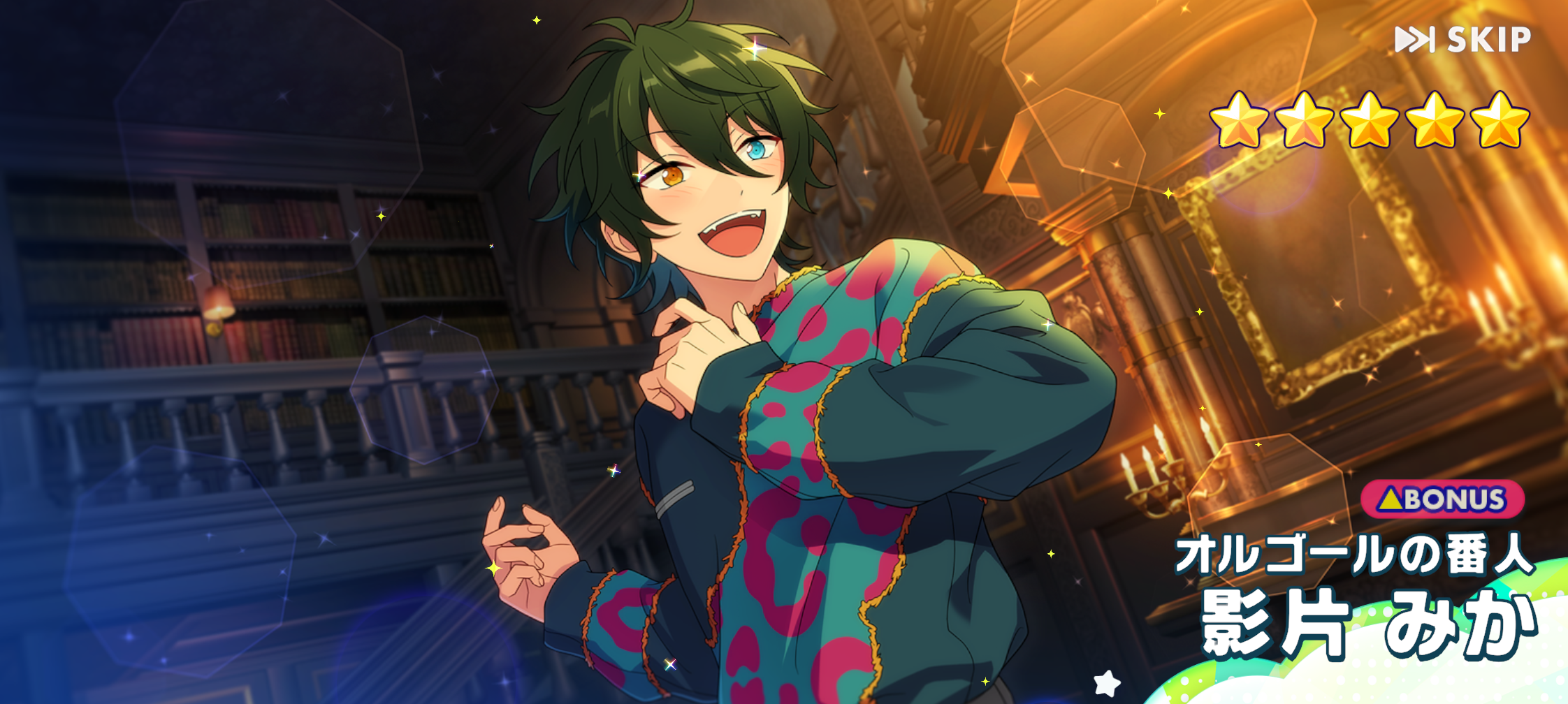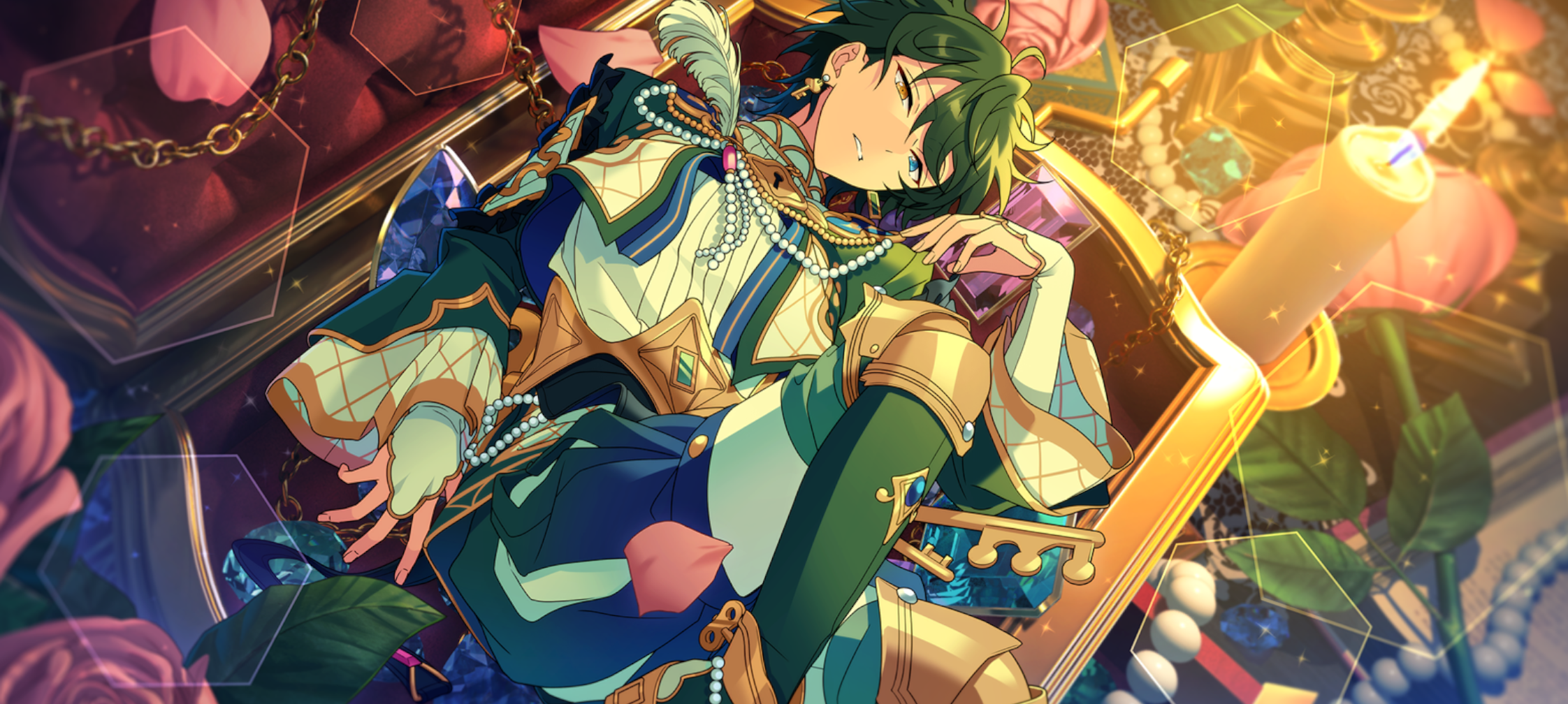IN A WONDERFUL BIT OF GOOD LUCK, MIKA ALSO CAME HOME FROM THE GACHA AND I AM FEELING BELOVED BY THE GOD OF LUCK!!!!! I'm going into this event with 150% rate up, so I'm gonna call that a win~

he looks so happy!!!! thank you for coming home, Mika ♥

also this Mika is so beautiful....I want to make icons of his bloomed *w*
The only downside is that now I have 3 different blue Mika 5 stars and zero green ones......maybe someday his first feature scout will come home....
Anyway, I did not end up liking the full MV for the MaM event and ended up so upset I slept most of yesterday D: Like I also hadn't slept much the night before, but like......I had a huge crash out and couldn't stay awake any longer. I don't wanna rehash everything I don't like again, because I'm trying to be more positive ;w; I just. Bluh. I'd been trying not to build it up in my mind and I know I still did, but it's not even like sorta not what I like, it's just.......boring.
The song is sooooooooooo boring. Maybe I'll like it more once I play it, but that's hit or miss. Good beatmaps can save things, I guess. But I'm not trying not to get my hopes up, since every part of this event has disappointed me.
except the scout boxes lmao
But honestly getting the beautiful Mika improved my mood XD I also bought enough dia to carry me through the event, so like...I'm ready!!! I just have to lock the fuck in and grind for 8 days straight~
When Pat and Liz get home from work, Liz is gonna take a nap so they can stay up all night with me and Pat is gonna go to Micro Center with me. We're 3D printing some of the stars that are in Madara's card because I'm making some decorations for the event and I need to get some yellow filament. Right now we're printing a glow-in-the-dark one because that's what Pat had on hand, but I also want some in the yellow like the card. Also, I need to swing by Michael's to get more ribbon so I can make my Madara nui a bow inspired by his terrible pastel outfit.
ALSO I WAS RIGHT ABOUT THE PASTEL PRINCE BULLSHIT since this week's megaphoto battle theme is "Fairytale Prince" and like. They're usually tied into the current event. But he barely looks like one; he looks more like an easter egg merged with a children's theater performer. And not a good one. Like, an annoying one XD And I'm married to a former children's theater performer, so I would know.
I'm trying to listen to the new song a few more times...maybe if I hear it enough I can trick myself into liking it....................

he looks so happy!!!! thank you for coming home, Mika ♥

also this Mika is so beautiful....I want to make icons of his bloomed *w*
The only downside is that now I have 3 different blue Mika 5 stars and zero green ones......maybe someday his first feature scout will come home....
Anyway, I did not end up liking the full MV for the MaM event and ended up so upset I slept most of yesterday D: Like I also hadn't slept much the night before, but like......I had a huge crash out and couldn't stay awake any longer. I don't wanna rehash everything I don't like again, because I'm trying to be more positive ;w; I just. Bluh. I'd been trying not to build it up in my mind and I know I still did, but it's not even like sorta not what I like, it's just.......boring.
The song is sooooooooooo boring. Maybe I'll like it more once I play it, but that's hit or miss. Good beatmaps can save things, I guess. But I'm not trying not to get my hopes up, since every part of this event has disappointed me.
But honestly getting the beautiful Mika improved my mood XD I also bought enough dia to carry me through the event, so like...I'm ready!!! I just have to lock the fuck in and grind for 8 days straight~
When Pat and Liz get home from work, Liz is gonna take a nap so they can stay up all night with me and Pat is gonna go to Micro Center with me. We're 3D printing some of the stars that are in Madara's card because I'm making some decorations for the event and I need to get some yellow filament. Right now we're printing a glow-in-the-dark one because that's what Pat had on hand, but I also want some in the yellow like the card. Also, I need to swing by Michael's to get more ribbon so I can make my Madara nui a bow inspired by his terrible pastel outfit.
ALSO I WAS RIGHT ABOUT THE PASTEL PRINCE BULLSHIT since this week's megaphoto battle theme is "Fairytale Prince" and like. They're usually tied into the current event. But he barely looks like one; he looks more like an easter egg merged with a children's theater performer. And not a good one. Like, an annoying one XD And I'm married to a former children's theater performer, so I would know.
I'm trying to listen to the new song a few more times...maybe if I hear it enough I can trick myself into liking it....................
Current Location: Garwyn Oaks, MD
Current Mood:  excited
excited
Current Music: Light on the Orbit ♪ MaM
Leave a comment

